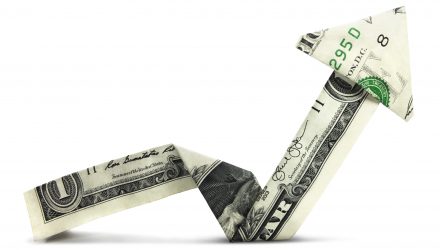High-yield corporate bond exchange traded funds, remain important pieces in helping investors bolster income streams while bringing needed diversity to investment portfolios. The iShares iBoxx $ High Yield Corporate Bond ETF (NYSEArca: HYG), the largest junk bond ETF, is higher by nearly 6% year-to-date.
HYG tracks the investment results of the Markit iBoxx USD Liquid High Yield Index, which is comprised of high yield U.S. corporate bonds that have less than investment-grade quality.
“High yield bond spreads – the difference in yields between high yield bonds and comparative government bonds – have widened, as perceived safe havens outperformed,” said BlackRock in a recent note. “These moves come amid a longer-term widening trend in credit spreads over the past couple of years. We see rates generally stable in the near term, with income taking back the reins from price changes as the key driver of credit returns in the quarters ahead.”
A spike in corporate defaults could be exactly what causes the party to end for all markets. The amount of corporate indebtedness has reached unprecedented levels, which has made these companies more susceptible to rising interest rates or worse, a recession. Fortunately, data suggest default rates are benign, for now, but economic activity could hold the key to junk bonds’ near-term fortunes.
“We see a narrow path ahead for risk assets to move higher at this late stage of the business cycle, but escalating trade conflicts could make this path even narrower,” said BlackRock. “We believe a balanced, diversified approach is key to investing in this environment. For fixed income investors in particular, we see high yield bonds as a key part of this approach, given their income-providing potential.”
Another Fixed Income ETF Idea
Cost-conscious investors can consider the iShares Broad USD High Yield Corporate Bond ETF (CboeBZX: USHY). USHY targets the CE BofAML US High Yield Constrained Index and charges 0.22% per year, but that fee is expected to decline to 0.15%, matching the cheapest junk bond ETFs.
“We see reasons to like U.S. high yield. First-quarter corporate earnings results pointed to healthier fundamentals in high yield issuers,” according to BlackRock. “These include signs of declining gross leverage and near-record high levels of interest coverage – a measure of issuers’ ability to service their debt. In addition, the longer-term credit quality of the index has improved. Evidence includes a shift in issuance toward higher quality (less CCC-rated bonds), shorter maturities and larger individual issues.”
USHY holds over 1,700 bonds with a 30-day SEC yield of 6.20% and an effective duration of 3.70 years.
For more information on the fixed-income space, visit our bond ETFs category.

